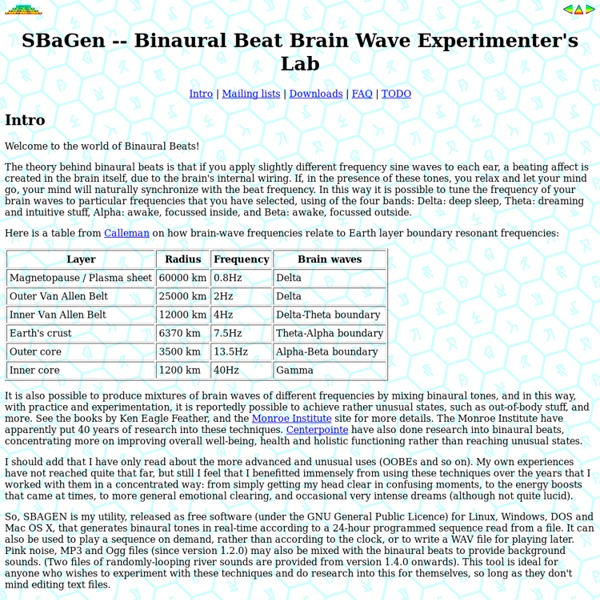Binaural Beat Brain Wave Experimenter's Lab

Gnaural: A Binaural-Beat Audio Generator
BrainWave Generator
Binaural Beat Generator | Free software downloads
Power Toys Pack Installer - Home
Watching the brain 'switch off' self-awareness
Everybody has experienced a sense of "losing oneself" in an activity - being totally absorbed in a task, a movie or sex. Now researchers have caught the brain in the act. Self-awareness, regarded as a key element of being human, is switched off when the brain needs to concentrate hard on a tricky task, found the neurobiologists from the Weizmann Institute of Science in Rehovot, Israel. The team conducted a series of experiments to pinpoint the brain activity associated with introspection and that linked to sensory function. They found that the brain assumes a robotic functionality when it has to concentrate all its efforts on a difficult, timed task - only becoming "human" again when it has the luxury of time. Ilan Goldberg and colleagues used functional magnetic resonance imaging (fMRI) to scan the brains of nine volunteers during the study. The series was shown slowly the first time, and at three times the rate on the second run through. Allocating resources More From New Scientist
Binaural beats
Binaural beats To experience the binaural beats perception, it is best to listen to this file with headphones on moderate to weak volume – the sound should be easily heard, but not loud. Note that the sound appears to pulsate. Now remove one earphone. Note that the pulsations disappear completely. The brain produces a phenomenon resulting in low-frequency pulsations in the amplitude and sound localization of a perceived sound when two tones at slightly different frequencies are presented separately, one to each of a subject's ears, using stereo headphones. Binaural beats reportedly influence the brain in more subtle ways through the entrainment of brainwaves[3][8][9] and provide other health benefits such as control over pain.[10][11] Acoustical background[edit] Interaural time differences (ITD) of binaural beats For sound localization, the human auditory system analyses interaural time differences between both ears inside small frequency ranges, called critical bands. History[edit]
Musiques de relaxation Gratuites ForceMajeure.com
The Monroe Institute | Explore Consciousness - Transform Your Life
JDownloader download manager for RapidShare - Download Squad
If you download a lot of files from free file hosting sites like RapidShare and MegaUpload, but are tired of entering Captchas and waiting for your downloads to begin, jDownloader can help. jDownloader is a download manager that works with both sites, plus a few others. It lets you queue up a bunch of files which it will then proceed to download in the background. It can even read Captchas, which means you don't have to be near your computer when the downloads start. The program does have a few quirks. First, jDownloader requires Java to run and you don't install it like a regular Windows application. Rather, you download and extract the contents of a ZIP file and then click the jDownloader.jar file to start the program. Second, jDownloader's file menus are all in German. Click the Extra button Select Konfiguration Select the Benutzeroberfläche tab Under Sprache, select English Hit the Speichern und neu starten button to save and restart in English Now you're almost ready to go.
Related:



